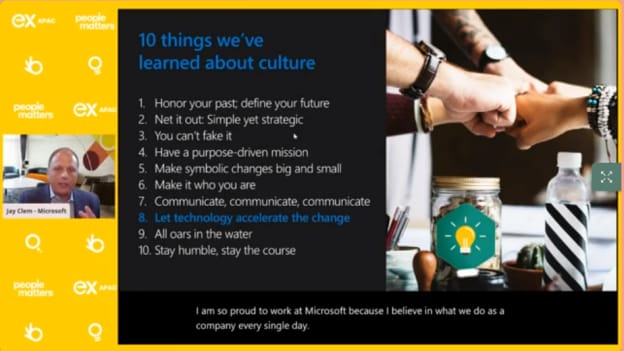Embracing hybrid for the future of work

The future of work poses several questions for leaders across the globe but one primary concern is how to adapt employees to the hybrid working model which is set to be the reality for organisations. Bringing people back to the office will have its own set of challenges but accommodating the varied choices of staying at home or coming to the workplace will require leaders to think about the larger picture of the organisation and how to embed in the values of both employee engagement and employee wellbeing. Digital transformation is a very critical tool in achieving this but even the application of digital solutions need to be carried out with thoughtful consideration.
At the People Matters EXAPAC Conference 2021, Jay Clem, General Manager-Employee Experience and Platforms, Microsoft offered his take on what HR leaders must keep in mind as they along with the people of their organisation adapt and adjust to this new reality of work.
It’s been acknowledged that the pace of digital transformation has been rapid and given how virtual work schedules demand that employees be easily available and make them sit through an endless series of meetings, most of the time they have no idea when their day starts and ends. The end result of this can be summed up in one word: burnout.
“76% of the workforce is suffering from burnout and it is an important statistic for leaders to consider when it comes to employee experience and creating a work environment where one can work from home or office ubiquitously. Because if that isn’t done, 42% of the workforce say that they are going to leave when this pandemic ends,” shared Jay.
Employee experience at the center of decision making
This possibility of mass resignations needs to be averted because the talent war has already been amplified. Geographical boundaries used to be the traditional barrier when it came to hiring talent but now that it is no longer an issue given how all operations tend to take place virtually, an organisation’s culture and its sense of purpose takes great precedence when it comes to not just hiring talent but also retaining them.
Jay went on to share that when 61% of leaders affirm that things are going great within their companies, it was found that only 38% of the employees agree. We are indeed at a very critical juncture and it is a must that we have clarity on how to make the hybrid model work for the people in a seamless way. Employee experience becomes a significant indicator. For the purpose of making office operations flow smoothly, a number of management systems ranging from those dealing with human capital to financial to legal has been set up and while it does serve its purpose, it also ends up confusing employees further, complicating the simplest of tasks. What must be done instead is to put employee experience at the center of decision making regarding tech solutions so that the ones which end up getting implemented aid them in learning, growing and thriving in the workplace.
“It all starts with culture,” emphasised Jay and goes on to highlight the importance of a learning culture, one that is catered to employee wellbeing as well and embeds the value of inclusivity as well. As important as accessible tech solutions are to retaining workers in the hybrid workplace, equally crucial is to build a network of colleagues who are always helping each other and enabling the creation of more connections.
Technology is a key enabler to not just accelerating change but also enabling change and in the hybrid working model, what matters is how an employee experiences not just these tech solutions but the overall culture of the company. How much does it care about them? How many opportunities does it give for employees to hit pause? To feel included? To learn and grow? Moving into a hybrid working model is inevitable but the impact it has on the organisation and on its workers can be defined by the decisions leaders make.
With a range of data at their disposal, they must leverage this information to gain insights on the state of employee experience and accordingly deploy strategies to enhance it. It is the best way to move ahead and make the most out of the future of work that is knocking at their doors.
Click here to find out more about Microsoft Viva, and how the EXP platform can help you build a people-powered workforce.
















